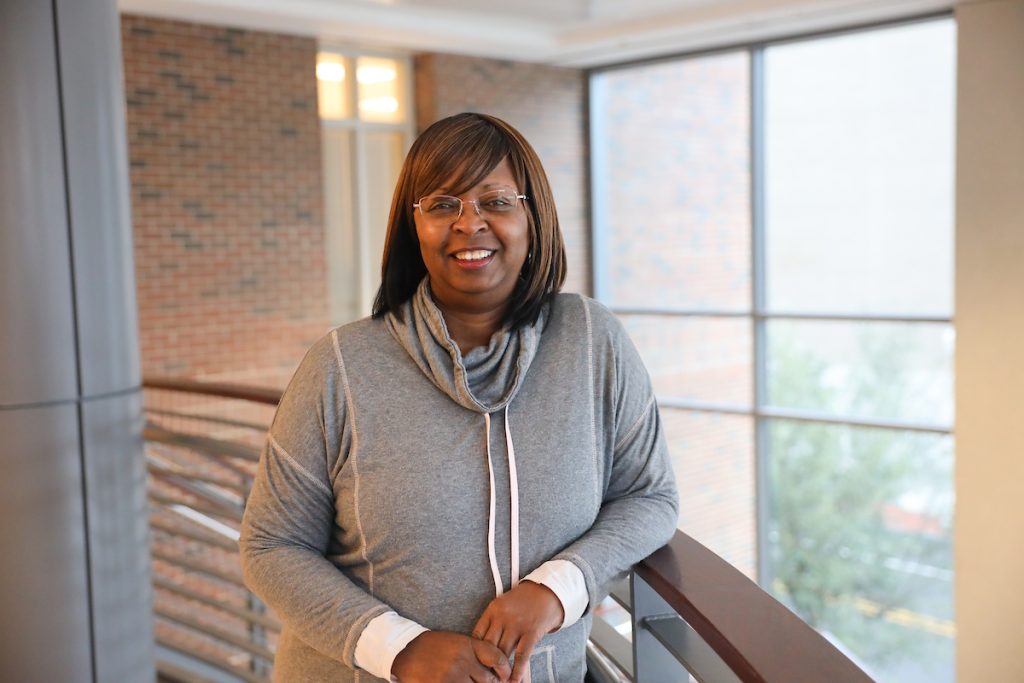CFCC graduate revamps career to help those in need

Following a corporate downsize, Jean Rogers found herself unemployed. While taking a moment to regroup, she discovered the happy ending for her story.
Rogers enrolled at CFCC in the Human Services Technology – Addiction and Recovery Services program. Now, she is pursuing her passion for helping individuals suffering from addiction and mental health issues.
WHEN LIFE GIVES YOU LEMONS
When Rogers found out she was being laid off from her longtime position, she was shocked. Fourteen years of working her way up the corporate ladder had ended.
Determined to achieve a positive outcome, Rogers considered her next move. She knew she didn’t want to return to a four-year college. So she explored the options available at CFCC.
“I’ve already been through the higher education channels, and I wanted to do something different,” Rogers explained. “My passion is to help people. CFCC was the school that had what I was looking for.”
Rogers also discovered she was eligible for the Workforce Innovation and Opportunity Act – Dislocated Worker Program (Title I) grant . Administered by the NCWorks Commission , the grant is available to eligible students who have lost their jobs and are seeking job training assistance. Rogers was able to use the grant program to assist with returning to school.
YOU MAKE LEMONADE
Initially, Rogers enrolled in an evening class to study case management for social work. During that course, she found out that CFCC offers an associate degree in her area of interest. With an associate degree in Human Services Technology – Addiction and Recovery Services, Rogers can be a case manager with a counseling component.
Similar to other health sciences and human services clinicals, internships are part of the Human Services Technology – Addiction and Recovery Services program. Through CFCC and the WIOA program, Rogers secured a paid internship.
During her internship, Rogers could use the screening tools she learned in class while handling client intake and assessment. She also had a chance to advise and counsel clients.
“Everything that I have learned in this program, I was able to apply in my internship,” shared Rogers. “I was able to start building my resume before I even graduated.”
Dr. LaTonya Niang, Human Services Technology program director, embraced having an adult learner in the program. She considers Rogers to be an asset to the recovery community.
“Having Jean in the classroom at Cape Fear Community College has been a great pleasure,” Niang comments. “The Human Services Technology addiction and Recovery Studies Program faculty are honored to have sown into her learning process. Jean is great “ground”; we are excited to see her impact on the region.”
IN-DEMAND CAREER
Rogers credits the quality of training and CFCC’s reputation for helping her immediately find a new job. The day after her internship ended, she received an interview request from Trillium Health Resources, where she is now employed.
“At Trillium, I am already seeing my training pay off as I help individuals with mental health issues or disabilities find housing,” Rogers commented. “And once I take my certification exam for Certified Alcohol and Drug Counselor, I can move up within the company.”
According to bls.gov , the job outlook for substance abuse counselors is growing at 22% or about 43,600 new openings annually — one of the fastest-growing occupations over the next decade. Demand for this occupation is anticipated to increase as states consider counseling services instead of jail time for those dealing with addiction or mental health issues.
CONSIDER A CAREER HELPING OTHERS
CFCC’s Human Services Technology – Addiction and Recovery Services program prepares students to assist individuals dealing with substance abuse or are in recovery and provides prevention education. Rogers’s experience in the program gave her confidence as she entered this new field.
“CFCC is very lucky to have Dr. Latonya Niang,” Rogers points out. “She’s very intelligent and knows the counseling and addiction processes like the back of her hand. It’s a win-win for CFCC, for students, and employers.”
If you are passionate about helping others, consider training as a substance use and addiction counselor. Visit Human Services Technology to learn how you can make a difference in people’s lives.

